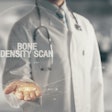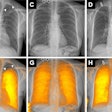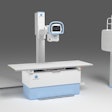A focus group study in the U.K. suggests participants are generally accepting of the use of AI software for diagnosing osteoporosis, a team at the University of Exeter has reported.
Researchers led by Fay Manning, PhD, held focus groups with 14 participants over the age of 50 to explore their acceptance of AI software (Ibex Bone Health) for the diagnosis of osteoporosis, which identifies patients at higher risk of fracture in a way similar to dual-energy x-ray absorptiometry (DEXA) scans.
"Overall, the participants were generally positive about the Ibex BH software, and predictive software in general stating, 'It sounds like a brilliant idea,'" the group wrote, in an article published September 19 in Radiography.
DEXA is the current gold standard for bone density assessment and subsequent fracture risk calculations, yet many patients in the U.K. are having to wait more than six weeks on average for an appointment, the researchers noted.
AI software could help alleviate these backlogs, yet patient views and acceptability of new diagnostic tools are paramount, given that patients are more likely to adhere to recommendations if they consider an intervention acceptable, the group added.
To explore the views of participants on AI software in general and the Ibex BH software in particular, the researchers recruited 14 people through a local osteoporosis patient advocacy group and held two semistructured focus groups. The majority of participants were women (78.6%) and 43% had a diagnosis of osteoporosis.
Among the findings was that, although participants did not understand the intricacies of the software, they did not feel they needed to, the researchers wrote.
"It wouldn't bother me, I don't want to know, I don't need to know, I am anticipating a future where preventative tests are being undertaken," said one participant.
Also, concerns about Ibex BH focused on the clinical indications of the software, with participants expressing less trust in results if they indicated medication, for instance. Participants felt they did not trust the software enough to take medications based on its result, the researchers wrote.
The survey participants also responded to questions about how and who would receive the results of the software and how the results would be communicated, the group noted. Individual choice was evident in these discussions, and most participants indicated a preference for spoken communication, according to the authors.
"I would expect that these results would be given by a human to another human," a participant said.
Some participants raised concerns regarding the safety of the data associated with the AI software, specifically in terms of who can access or "hack" into it, the researchers wrote. There were also some negative feelings regarding whether patients would be aware or consent to Ibex BH being integrated into their DEXA exams.
"Participants indicated there may be 'shock' and 'horror' if they were informed they had osteoporosis but maybe didn't want to know," the researchers wrote.
Ultimately, the focus group participants were generally accepting of the use of predictive AI software in healthcare, with this study highlighting key aspects of implementation from the perspectives of patients, according to the group.
"Future research should focus on perceptions of primary care and secondary care practitioners, their acceptability and views on implementation," the team concluded.
The full article is available here.



















